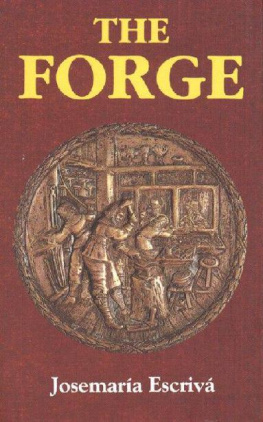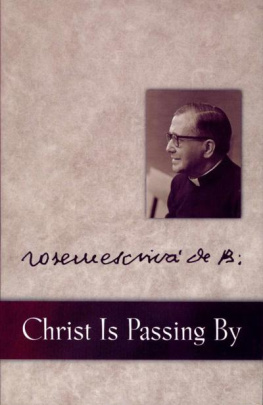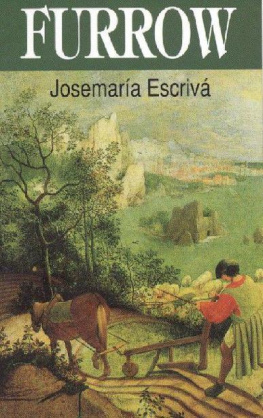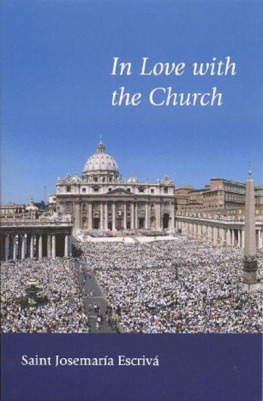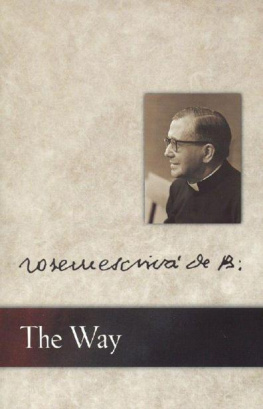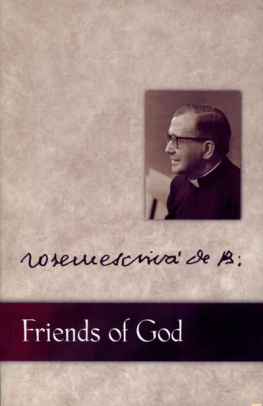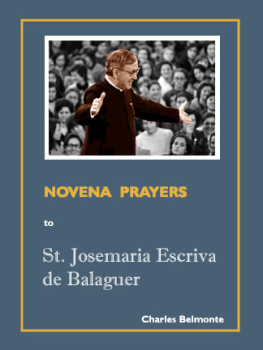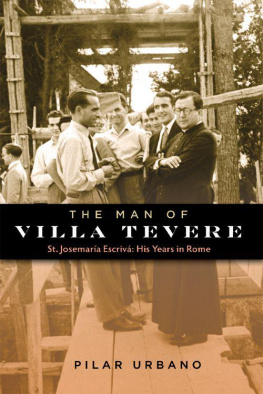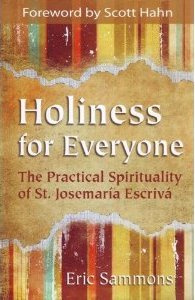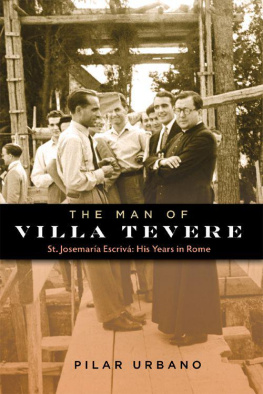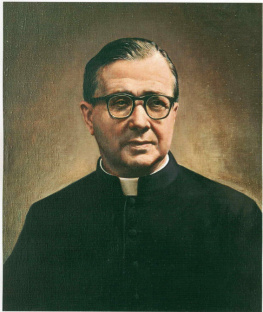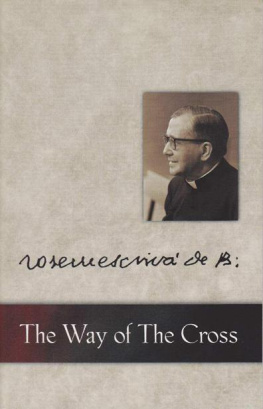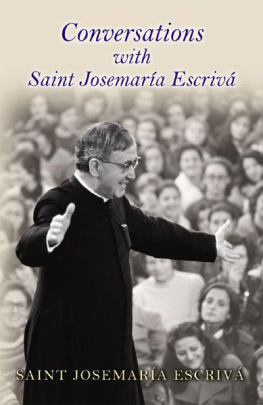St Josemaría Escrivá - The Forge
Here you can read online St Josemaría Escrivá - The Forge full text of the book (entire story) in english for free. Download pdf and epub, get meaning, cover and reviews about this ebook. year: 0, genre: Religion. Description of the work, (preface) as well as reviews are available. Best literature library LitArk.com created for fans of good reading and offers a wide selection of genres:
Romance novel
Science fiction
Adventure
Detective
Science
History
Home and family
Prose
Art
Politics
Computer
Non-fiction
Religion
Business
Children
Humor
Choose a favorite category and find really read worthwhile books. Enjoy immersion in the world of imagination, feel the emotions of the characters or learn something new for yourself, make an fascinating discovery.
- Book:The Forge
- Author:
- Genre:
- Year:0
- Rating:3 / 5
- Favourites:Add to favourites
- Your mark:
- 60
- 1
- 2
- 3
- 4
- 5
The Forge: summary, description and annotation
We offer to read an annotation, description, summary or preface (depends on what the author of the book "The Forge" wrote himself). If you haven't found the necessary information about the book — write in the comments, we will try to find it.
The Forge — read online for free the complete book (whole text) full work
Below is the text of the book, divided by pages. System saving the place of the last page read, allows you to conveniently read the book "The Forge" online for free, without having to search again every time where you left off. Put a bookmark, and you can go to the page where you finished reading at any time.
Font size:
Interval:
Bookmark:

THE FORGE
Josemara Escriv
THE FORGE

1988 Forja
by SCRIPTOR, S.A. (MADRID)
1988 The Forge
by SCEPTER (LONDON).
2011 The Forge
by SCEPTER (NEW YORK)
SCEPTER PUBLISHERS
P.O. Box 211, New York
NY 10018
All rights reserved. No part of this book may be reproduced, stored in a retrieval system or transmitted in any form or by any means, electronic, mechanical, photocopying or otherwise, without the prior permission of the publisher.
eBook ISBN 978-1-594171-06-2
The cover is a silver medallion depicting a goldsmiths shop (17th century). Curtius Museum, Liege, Belgium.
With ecclesiastical approval
CONTENTS
Saint Josemara Escriv was born in Barbastro, in northern Spain, on January 9, 1902. At the age of 15 or 16, he began to feel the first intimations that God was calling him and he decided to become a priest. He started his ecclesiastical studies in the Seminary of Logroo in 1918, and later, in 1920, in that of St Francis de Paula in Saragossa, where from 1922 he was a superior or tutor. In 1923 he began to study Civil Law in the University of Saragossa, with the permission of his ecclesiastical superiors. These studies did not interfere with his theological studies. He was ordained deacon on December 20, 1924 and became a priest on March 28, 1925.
He began his work as a priest in the village of Perdiguera, within the diocese of Saragossa, and afterwards in Saragossa itself. In the spring of 1927, with the permission of the Archbishop of Saragossa, he moved to the Spanish capital Madrid and there carried out abundant priestly work among all kinds of people, devoting attention also to the poor and destitute in the outlying districts of the city, and especially to the incurably sick and the dying in the hospitals. He worked as chaplain to the Patronato de Enfermos (Foundation for the Sick), a welfare organization run by the Apostolic Sisters of the Sacred Heart. He also taught at a university academy, and continued his studies for a doctorate in Civil Law, which at that time could only be obtained from the University of Madrid.
On October 2, 1928 God made him see clearly what up to then he had only inklings of; and Saint Josemara Escriv founded Opus Dei (in English, the Work of God). Under Gods continuing guidance, on February 14, 1930 he understood that he must open up the apostolic work of Opus Dei to women also. As a result, a new path was opening up in the Church, to promote, among people of all social classes, the search for holiness and the practice of the apostolate, through the sanctification of ordinary work, in the midst of the world and without changing ones state in life.
From October 2, 1928, the Founder of Opus Dei directed his energies to the mission God had entrusted to him, with great apostolic zeal for all souls. In 1934 he was appointed Rector of the Patronato de Santa Isabel (St Elizabeth Foundation). During the Spanish Civil War, at times putting his life at risk, he carried out his priestly ministry in Madrid and, subsequently, in the northern city of Burgos. Already in those years Saint Josemara Escriv experienced harsh and sustained opposition, which he bore calmly and with a supernatural outlook.
On February 14, 1943 he founded the Priestly Society of the Holy Cross, which is inseparably united to Opus Dei and which, as well as opening up the possibility of ordaining lay members of Opus Dei to the priesthood and incardinating them for the service of the Work, would later on also enable priests who are incardinated in dioceses to share the spirituality and asceticism of Opus Dei, seeking holiness in the exercise of their ministerial duties, while remaining exclusively under their respective Ordinaries.
In 1946 he took up residence in Rome, which was to be his home for the rest of his life. From there, he stimulated and guided the development of Opus Dei throughout the world, using all his energies to give to the men and women of Opus Dei a solid formation in doctrine, ascetical spirit and apostolate. At the time of his death, Opus Dei had more than 60,000 members from 80 different nationalities.
Saint Escriv was a Consultor to the Pontifical Commission for the authentic interpretation of the Code of Canon Law, and to the Sacred Congregation for Seminaries and Universities. He was a Domestic Prelate and an honorary Academician of the Pontifical Roman Academy of Theology. He was also the Chancellor of the Universities of Navarre (in Spain) and Piura (in Peru).
Saint Josemara Escriv died on June 26, 1975. For years, he had been offering his life for the Church and for the Pope. He was buried in the Crypt of the church of Our Lady of Peace, in Rome. Msgr. Alvaro del Portillo (1914-1994), who for many years had been his closest collaborator, was unanimously elected to succeed him. The present Prelate of Opus Dei is Msgr. Javier Echevarria, who also worked for several decades with Saint Josemara Escriv and with his first successor, Msgr. del Portillo. Opus Dei, which from its inception had had the approval of the diocesan authorities and from 1943, also the appositio manuum and subsequently the approval of the Holy See, was established as a Personal Prelature by his holiness Pope John Paul II on November 28, 1982: this was the canonical formula foreseen and desired by Saint Josemara Escriv.
The reputation for holiness which the Founder of Opus Dei enjoyed in his lifetime has spread after his death to the far corners of the earth, as can be seen from countless spiritual and material favors attributed to his intercession; among them, a number of cures which are medically inexplicable. Many letters from all the continents, and among them those of 69 Cardinals and nearly 1300 Bishops (more than a third of the episcopate worldwide), were written requesting the Pope to open the Cause of Beatification and Canonization of Msgr. Escriv. The Congregation for the Causes of Saints gave its nihil obstat for the opening of the Cause on January 30, 1981 and this was ratified by Pope John Paul II on February 5, 1981.
Between 1981 and 1986 two processes took place, one in Rome and the other in Madrid, to gather information on the life and virtues of Msgr. Escriv. Following the results of these two processes and accepting the favorable opinions of the congress of theological consultors and the Commission of Cardinals and Bishops, members of the Congregation for the Causes of Saints, the Holy Father, on April 9, 1990, declared the heroicity of the virtues of Msgr. Escriv, who thus received the title of Venerable. On July 6, 1991, the Pope commanded the publication of a Decree declaring the miraculous nature of a cure attributed to the intercession of the Venerable Josemara Escriv. This act completed the juridical stages for the beatification of the Founder of Opus Dei, which was celebrated in Rome on May 17, 1992, in a solemn ceremony presided over by his holiness Pope John Paul II in St Peters Square. Josemara Escriv was canonized on October 6, 2002.
From May 21, 1992, the body of Saint Josemara rests in the altar of the Prelatic Church of Our Lady of Peace, in the central offices of the Prelature of Opus Dei. It is accompanied constantly by the prayers and thanksgiving of many people from all over the world who have been brought closer to God, attracted by the example and teachings of the founder of Opus Dei and by the devotion of those who turn to his intercession.
Among his published writings, apart from the theological and legal study La Abadesa de las Huelgas , there are books of spirituality which have been translated into numerous languages: The Way, Holy Rosary, Christ is Passing By, Friends of God, The Way of the Cross, Loving the Church, Furrow, The Forge (the last five titles have been published posthumously). Another book, which brings together press interviews, has the title Conversations with Msgr. Escriv.
Next pageFont size:
Interval:
Bookmark:
Similar books «The Forge»
Look at similar books to The Forge. We have selected literature similar in name and meaning in the hope of providing readers with more options to find new, interesting, not yet read works.
Discussion, reviews of the book The Forge and just readers' own opinions. Leave your comments, write what you think about the work, its meaning or the main characters. Specify what exactly you liked and what you didn't like, and why you think so.

